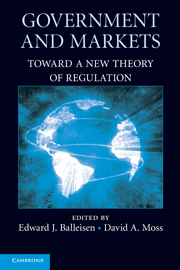Book contents
- Frontmatter
- Contents
- Acknowledgments
- Contributors
- Introduction
- SECTION I BEYOND MARKET FAILURE
- SECTION II BEYOND THE ECONOMIC THEORY OF POLITICS
- SECTION III BEYOND COMMAND AND CONTROL
- 10 What Opportunity Is Knocking? Regulating Corporate Governance in the United States
- 11 Taxation as a Regulatory Tool: Lessons from Environmental Taxes in Europe
- 12 Redesigning Regulation: A Case Study from the Consumer Credit Market
- 13 Origins and Regulatory Consequences of the Subprime Crisis
- 14 The Prospects for Effective Coregulation in the United States: A Historian's View from the Early Twenty-First Century
- 15 Deregulation Theories in a Litigious Society: American Antitrust and Tort
- 16 Markets in the Shadow of the State: An Appraisal of Deregulation and Implications for Future Research
- Conclusion
- Index
- References
15 - Deregulation Theories in a Litigious Society: American Antitrust and Tort
Published online by Cambridge University Press: 20 January 2010
- Frontmatter
- Contents
- Acknowledgments
- Contributors
- Introduction
- SECTION I BEYOND MARKET FAILURE
- SECTION II BEYOND THE ECONOMIC THEORY OF POLITICS
- SECTION III BEYOND COMMAND AND CONTROL
- 10 What Opportunity Is Knocking? Regulating Corporate Governance in the United States
- 11 Taxation as a Regulatory Tool: Lessons from Environmental Taxes in Europe
- 12 Redesigning Regulation: A Case Study from the Consumer Credit Market
- 13 Origins and Regulatory Consequences of the Subprime Crisis
- 14 The Prospects for Effective Coregulation in the United States: A Historian's View from the Early Twenty-First Century
- 15 Deregulation Theories in a Litigious Society: American Antitrust and Tort
- 16 Markets in the Shadow of the State: An Appraisal of Deregulation and Implications for Future Research
- Conclusion
- Index
- References
Summary
For much of the twentieth century, conceptions of market efficiency in American antitrust and tort law combined understandings of market incentives with moralistic concerns and social values. The relative institutional autonomy of these judicial-centered fields contrasted with the public choice school of thought that, Jessica Leight demonstrates, has dominated American policy analysis in recent decades. The two fields of law challenge public-choice assumptions that government's “self-centered behavior” succumbs to “private capture” and inevitably undermines legitimate economic policies. Similarly, though these legal fields are not expressly addressed in Daniel Carpenter's constitutive theory of regulation, they provide evidence that the adversarial judicial process can, employing his vocabulary, “constitute” certain market practices as “approval regulation,” and through discovery “overcome information asymmetries,” which in turn “credence good markets” defined as “improved social welfare.” In addition, large damage awards won though antitrust and tort litigation suggest how the adversarial judicial process could be applied – by strengthening private actions within the securities field – to ameliorate what Mary O'Sullivan calls the “hegemony” of “maximizing shareholder value” that has prevailed for decades in American corporate governance.
Since the 1970s a global deregulation movement has sought to orient market relations, political systems, and legal institutions around a particular conception of economic rationality, which stressed reliance on monetary incentives and the pursuit of economic efficiency, narrowly construed. American antitrust and tort law were consistent with this movement's effort to adjust incentives for individual and group action.
- Type
- Chapter
- Information
- Government and MarketsToward a New Theory of Regulation, pp. 482 - 511Publisher: Cambridge University PressPrint publication year: 2009

